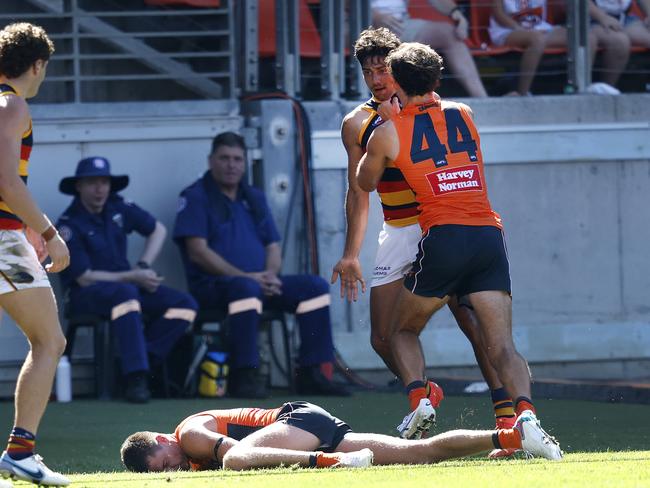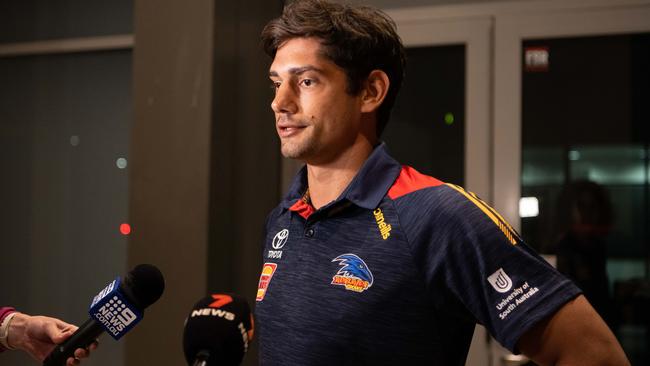Port fans would have other stories of football injustice | Graham Cornes
One line used to justify upholding Shane McAdam’s ban makes absolutely no sense, writes Graham Cornes.
Opinion
Don't miss out on the headlines from Opinion. Followed categories will be added to My News.
WE shouldn’t be surprised Shane McAdam received no respite from the AFL Appeals Board.
The South Australian AFL teams have always been marked harder by Victorian umpires, the Match Review Officer and, before him, the tribunal.
Call me paranoid, delusional, and unashamedly parochial and you would be right, but the record speaks for itself. We can trace it all the way back to VFL/SANFL state clashes of last century.
There was no greater interstate warrior than Neil Kerley, as both a player and a coach. He never minced his words. “These Victorian umpires will cheat”, he would roar at us in his pre-match orations. “Just ignore it and get on with the game.”
It was easier said than done.
In 1991 the Crows first season in the AFL, we were confronted with the same reality. “Kerls” was the club’s first football manager and sat in the coach’s box on match day. He never tried to disguise his disdain for umpiring non-decisions. For it wasn’t so much the free kicks our team gave away, it was the similar ones we weren’t awarded.
The same bias still prevails, as evidenced by the treatment Port Adelaide received in the first half of last week’s season-opener against Brisbane.

When it came to the tribunal it was more of the same. You would not have seen a more scrupulously fair player than the club’s first centre-half-forward, John Klug. In an era when elbows were often raised, fists thrown and sickening shirt-front bumps were demanded of players and celebrated by the fans and commentators, Klug was reported for elbowing Carlton’s giant ruckman, Justin Madden.
Obscure vision of the action on the mudheap that was Princes Park, Carlton’s home ground, was found from which to charge him. It was the only time in his career that he was reported.
Of course, he was found guilty and served a two-week suspension when others, particularly the star players, were treated much more leniently.
A couple of games later, Michael Murphy, one the more rugged original Crows players, was involved in an altercation with a Footscray player at the Western Oval, who he pushed vigorously in the chest. The umpire saw it differently and reported him for punching his opponent in the face.
There was no vision, so much to the chagrin of Kerley who had to defend the player, the umpire’s version of the incident was believed by the tribunal. It must be said Murphy’s previous offence when he was guilty of punching a Carlton opponent didn’t help his cause, but it still wasn’t right.
This may be personal, but there was the time Kane Cornes was given a three-match suspension for nudging his opponent Sam Mitchell in the back. It didn’t help that the Hawthorn captain collapsed theatrically to the ground.
A three-match suspension was a ridiculously severe penalty for an innocuous action that happens dozens of times in any match. Reduced to one match for a good record and an early guilty plea helped but didn’t make it right. Port fans would have other stories of football injustice.

Throughout the short AFL histories of both teams there are numerous examples of our South Australian clubs being shafted by a Victorian-based system. Worst was the penalties handed to the Crows, Kurt Tippett, Steven Trigg and Phil Harper for the supposed Tippett salary cap breach which, while evident, was nothing more than a technicality.
Which leads us to the Shane McAdam brain fade. It can be described as nothing less than a brain fade, because no footballer in his right mind today would choose to launch himself at an opponent to make front-on contact.
Yet two footballers did exactly that last weekend. Different games, different players, but the actions of McAdam and Melbourne’s Kysaiah Pickett are almost identical.
It is impossible to fathom why McAdam’s was assessed more seriously and he had to front the tribunal which handed down a penalty that was 50 per cent more punitive. Was it because he was from Adelaide?
The club’s appeal fell on deaf ears because of this damning phrase that has been added to Match Review Officer’s deliberations. “Potential to cause injury” now has be considered when assessing the seriousness of an offence.
Potential to cause injury? What on earth can that mean? Every action of a footballer has the potential to cause injury. Every time a player flies for a pack mark or from behind in a one-on-one contest, a footballer has the potential to (and often does) cause injury.
How can this factor be calculated? In the two instances last weekend in which the force of contact looked identical, Bailey Smith jumped immediately to his feet after being hit by Pickett; Jacob Wehr didn’t. That doesn’t necessarily mean that McAdam’s hit was harder. It might mean that Bailey Smith is tougher, more determined or has a higher tolerance of pain.
One of Neil Kerley’s demands, and I suspect it is true of most coaches from earlier eras, was: “Never let them know you’re hurt.” As old school as it sounds, there is something admirable about the stoic competitor who gets to his feet to face the next challenge.
Wehr may have been winded but he wasn’t concussed and eventually returned to the field to participate in GWS’s courageous win. How could McAdam’s hit have been regarded as more serious? Was it simply because he wears red, blue and yellow?

The Match Review Officer, Michael Christian, has a difficult job, made even more difficult by the morass of a matrix by which he has to consider a player’s actions.
In 2014 the AFL, in trying to simplify a complicated tribunal system, made it even more complicated by introducing a combination of 24 actions to consider and cross reference. That’s where the terms like intentional, careless, severe impact, high contact etc, came into to play. Twenty-four of them to consider! And now they’ve added another one: POTENTIAL TO CAUSE INJURY! The Monty Python script writers couldn’t have made that up.
For McAdam this couldn’t have come at a worse time in his football career. He came to elite football late. From that remote town, Hall’s Creek in the East Kimberley Region of Western Australia, his football journey has taken him to Claremont, Carlton, Scotch College Old Collegians and Sturt, by which time he would have thought an AFL career had passed him by.
But Adelaide saw something in him, gave him an opportunity and after 44 games that faith looked as if it would be repaid. As with so many indigenous players, there is something special about him. Let’s hope an undisciplined act – that rush of blood – doesn’t derail his career.
He deserved the same penalty as Pickett, but not more. It is of little consequence to know, but if you’re from Adelaide you will be judged more harshly.
He’s 27 now and turning 28 in May. Hopefully these three weeks won’t derail what was steadily becoming an impressive career.





